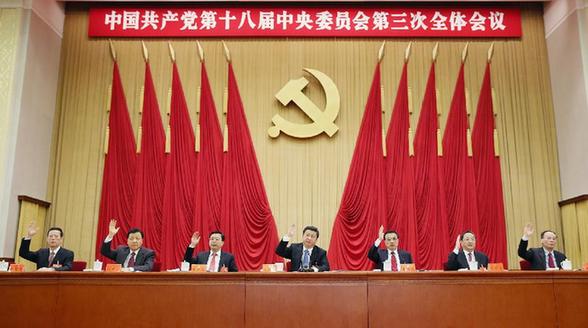Future development steps outlined at the Third Plenum
- By Eugene Clark
 0 Comment(s)
0 Comment(s) Print
Print E-mail China.org.cn, November 13, 2013
E-mail China.org.cn, November 13, 2013
While it is true that the world today is much more inter-connected and global economies are increasingly intertwined, it is a mistake to assume that the path to economic prosperity and general development is the same for every country.
|
|
|
Top Chinese leaders Xi Jinping (C), Li Keqiang (3rd R), Zhang Dejiang (3th L), Yu Zhengsheng (2nd R), Liu Yunshan (2nd L), Wang Qishan (1st R), Zhang Gaoli (1st L) attend the third Plenary Session of the 18th CPC Central Committee in Beijing, capital of China, Nov. 12, 2013. The session lasted from Nov. 9 to 12. [Photo/Xinhua] |
Importance of economic reform and benefits of good design
A major focus of the 18th Central Committee of the Communist Party of China (CPC) has been to create China's design for economic reform. Elements of a good design include a compelling vision, sound policy framework; effective implementation, transparency, regular monitoring, adequate checks and balances against concentration of power and effective enforcement of the law. Moreover, the reforms must reach all levels of government and society. Thus, the economic and social reforms discussed over the three days of the Committee's Third Plenum should be seen in the context of a much wider and extensive set of reforms occurring all across China and in both public and private sectors.
From the Communique of the Third Plenum, it is clear that China is acutely aware of the central role that the economy plays in China's next stage of advancement. This includes recognition of the fundamental role of the market as the best vehicle to determine the allocation of resources. At the same time, China has to forge a path that reflects its unique form of socialism with a major role played by state-owned enterprises and government in leading economic reform.
Building robust institutions
It is also significant that President Xi Jinping and the Third Plenum Communique and discussions have emphasized the importance of building strong institutions. China has experienced so much change over the last 25 years and the institutions of the past must be "re-booted" to meet the needs of a 21st century China, the global economy and information age. Thus, the judiciary, taxation, customs, accounting, intellectual property administration, health, education, social security, transportation, telecommunications and other institutions and systems must be reformed with each playing a part in advancing Chinese society.






